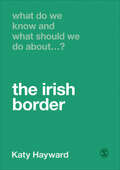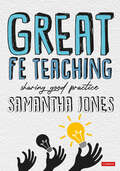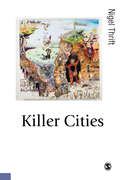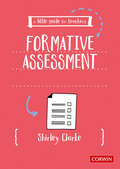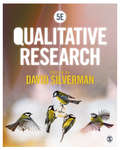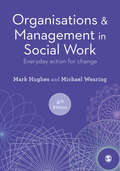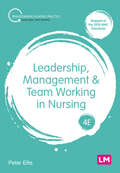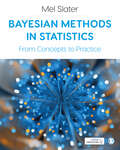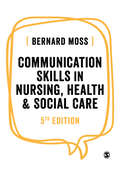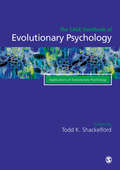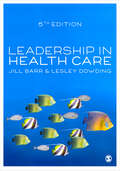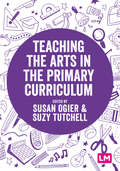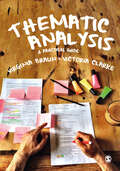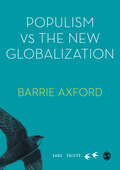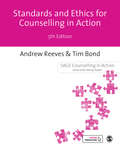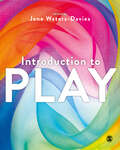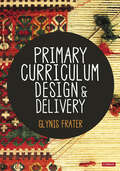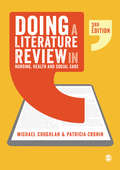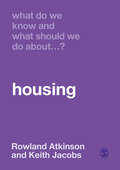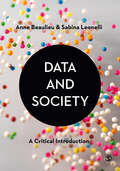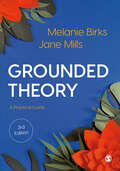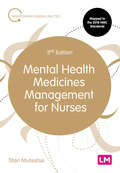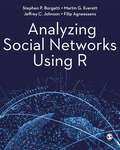- Table View
- List View
What Do We Know and What Should We Do About the Irish Border? (What Do We Know and What Should We Do About:)
by Katy HaywardThe Irish border is a manifestation of the relationship between Britain and Ireland. When that relationship has been tense, we have seen the worst effects at the Irish border in the form of violence, controls and barriers. When the relationship has been good, the Irish border has become - to all intents and purposes - open, invisible and criss-crossed with connections. Throughout its short existence, the symbolism of the border has remained just as important as its practical impact. With the UK’s exit from the European Union, the challenge of managing the Irish border as a source and a symbol of British-Irish difference became an international concern. The solution found in the UK-EU Withdrawal Agreement gives the Irish border a globally unique status. A century after partition, and as we enter the post-Brexit era, this book considers what we should know and do about this highly complex and ever-contested boundary line.
Great FE Teaching: Sharing good practice
by Samantha JonesProfessional learning and development by FE teachers, for FE teachers. Celebrating great teaching and learning across the UK′s most diverse education sector. This new title invites you into the minds and classrooms of FE teachers and encourages you to ′think side by side′ with them. *Brings together experienced teachers to profile their practice and share learning *Offers a unique view into classrooms and into the practice of experienced teachers *Enables readers to observe and reflect on the work of fellow professionals *Opens up the discussion of what makes great FE teaching *Profiles and highlights the great work and great teachers in FE
Killer Cities (Published in association with Theory, Culture & Society)
by Nigel ThriftKiller Cities uses a combination of social theory, polemic and close attention to empirical detail to tell the story of how and why cities cause mass animal death and, in the process, hasten the destruction of the planet. This book is not just a lament, however. It is an attempt to navigate out of this mess of planned and unplanned violence towards a world in which cities no longer act as killers but become aligned with the lives of other beings. It offers pragmatic ways of diminishing the death toll and changing mindsets without ever minimizing the dilemmas that inevitably will have to be faced. Killer cities can be rehabilitated so that they offer brighter paths towards the future - for animals, for human beings, and for the planet. A new urban geography could be within our grasp. Indeed, it has to be, for all of our sakes.
A Little Guide for Teachers: Formative Assessment (A Little Guide for Teachers)
by Shirley ClarkeBridging the gap between research and practice A Little Guide for Teachers: Formative Assessment gives teachers practical tried and tested strategies to put formative assessment into action in their classrooms. The Little Guide for Teachers series is little in size but BIG on all the support and inspiration you need to navigate your day to day life as a teacher. · Authored by experts in the field · Easy to dip in-and-out of · Interactive activities encourage you to write into the book and make it your own · Fun engaging illustrations throughout · Read in an afternoon or take as long as you like with it!
Qualitative Research
by David SilvermanWritten by leaders of qualitative methodology, this book provides up-to-date and interdisciplinary insight into a range of qualitative methods. Bringing together different perspectives, contributors discuss theoretical underpinnings of these methods before taking readers through the process of each approach and helping them develop skills needed to carry out this type of research autonomously and with confidence. Highlights include: New chapters on multimethod qualitative research, using digital data and video, and addressing social issues in research. More guidance on how to store and manage data appropriately. Advice on how to publish research in journals. Full of practical tips, exercises and summaries, this book continues to be a masterclass in qualitative research for students and researchers across the social sciences and beyond.
Organisations and Management in Social Work: Everyday Action for Change
by Mark Hughes Michael WearingAs a social worker, you could work in a variety of different organisations, each with their own purpose, culture and structure. Understanding and examining the complex issues involved in the management and organisational context of social work practice is crucial for practitioners and managers. This book helps you to develop strategies for ethical, reflective and relational practice, covers key themes including leadership, supervision, risk and decision making and emphasises the importance of active participation for positive change. Thoroughly updated, and with new Practice Examples demonstrating the relationship between theory and practice, this is essential reading for both undergraduate and postgraduate students of social work, as well as practising social workers.
Leadership, Management and Team Working in Nursing (Transforming Nursing Practice Series)
by Peter EllisLeadership is central to all aspects of the nursing role, from managing the delivery of high quality care to acting as a role model for best practice. Written specifically for nursing students, this book introduces you to the principles and practice of leadership, management and multi-disciplinary team working. Key features: o Each chapter is mapped to the 2018 NMC standards o Introduces the core leadership theory you need to know, using case studies and reflective activities to show how it relates to your practice o Updated throughout including new content on the impact of COVID-19 and increased coverage of emotional intelligence and resilience o Builds your understanding of the challenging aspects of leadership including managing conflict, being assertive and leading service improvement
Bayesian Methods in Statistics: From Concepts to Practice
by Mel SlaterThis book walks you through learning probability and statistics from a Bayesian point of view. From an introduction to probability theory through to frameworks for doing rigorous calculations of probability, it discusses Bayes’ Theorem before illustrating how to use it in a variety of different situations with data addressing social and psychological issues. The book also: Equips you with coding skills in the statistical modelling language Stan and programming language R. Discusses how Bayesian approaches to statistics compare to classical approaches. Introduces Markov Chain Monte Carlo methods for doing Bayesian statistics through computer simulations, so you understand how Bayesian solutions are implemented. Features include an introduction to each chapter and a chapter summary to help you check your learning. All the examples and data used in the book are also available in the online resources so you can practice at your own pace. For readers with some understanding of basic mathematical functions and notation, this book will get you up and running so you can do Bayesian statistics with confidence.
Communication Skills in Nursing, Health and Social Care
by Bernard MossOur ability to communicate is a key part of everyday life and is an essential skill, particularly when communicating with vulnerable people in a health and social care setting. Presented in a unique and easy-to-use dictionary format, this practical guide will help students and practitioners understand and apply the principles of effective communication. From the ‘how to’ practicalities through to challenges and honing existing skills, this book will ensure they have the confidence and knowledge to communicate skilfully and successfully in many different contexts and settings. The new edition features: New chapter entries covering empathy, documentation and simulation Group exercises added in each chapter New information on National Accessible Information Standards on learning difficulties Essential reading for anyone working in the helping professions for whom good communication skills are an essential part of their role.
The SAGE Handbook of Evolutionary Psychology: Applications of Evolutionary Psychology
by Todd K. ShackelfordEvolutionary psychology is an important and rapidly expanding area in the life, social, and behavioral sciences, and this Handbook represents the most comprehensive and up-to-date reference text in the field today. Chapters in this Handbook address real-world and practical applications of evolutionary psychology such as applications to medicine, psychiatry, law, and technology. The SAGE Handbook of Evolutionary Psychology is an essential resource for researchers, graduate students, and advanced undergraduate students in all areas of psychology, and in related disciplines across the life, social, and behavioral sciences. Part 1: Applications to Health and Well-Being Part 2: Applications to Law and Order Part 3: Applications to Technology, Communications, and the Future
Leadership in Health Care
by Jill Barr Lesley DowdingDesigned to guide you through a structured approach to building your leadership skills, this book uses case studies, practical examples, and reflective questions to help you engage with every aspect of leadership. It explores a wide range of topics and ideas from teamwork, communication, and problem-solving, to emotional intelligence, critical self-reflection, and quality of care to provide an ideal platform for learning. It is suitable for all professions allied to medicine, including students of adult, mental health, children and learning disability nursing and midwifery, as well as nursing associates, specialist community public health nurses, physician associates, paramedic sciences, and more.
Teaching the Arts in the Primary Curriculum (Exploring the Primary Curriculum)
by Suzy Tutchell Susan OgierLearning in the arts does not fit in with simple, conventional methodologies for teaching and assessing in the traditional sense, but it has an immense power to transform children’s understanding of the world around them, and their lives. Many jobs, currently and of the future, will demand the skills that learning in the arts will develop. This book brings Arts Education sharply into focus as a meaningful, learning experience for children of pre-school and primary age (3-11 years). It reinforces the potential for the wide range of physical, mental and emotional development, through learning opportunities that engagement in arts practice facilitates. Provides insight into how teachers can support children to consider contemporary challenges that face their generation. Includes expert voices from the world of education to demonstrate an expansive, and perhaps surprising, view of where and how the Arts can be found. Shows how we can bring the arts so easily into our curriculum, and into our classrooms.
Thematic Analysis: A Practical Guide
by Victoria Clarke Virginia Braun**Winner of the 2022 British Psychological Society Book Award - Textbook Category** Developed and adapted by the authors of this book, thematic analysis (TA) is one of the most popular qualitative data analytic techniques in psychology and the social and health sciences. Building on the success of Braun & Clarke′s 2006 paper first outlining their approach - which has over 100,000 citations on Google Scholar - this book is the definitive guide to TA, covering: - Contextualisation of TA - Developing themes - Writing TA reports - Reflexive TA It addresses the common questions surrounding TA as well as developments in the field, offering a highly accessible and practical discussion of doing TA situated within a clear understanding of the wider terrain of qualitative research. Virginia Braun is a Professor in the School of Psychology at The University of Auckland, Aotearoa New Zealand. Victoria Clarke is an Associate Professor in Qualitative and Critical Psychology in the Department of Social Sciences at the University of the West of England (UWE), Bristol.
Populism Versus the New Globalization (SAGE Swifts)
by Barrie AxfordPopulism and globalization are shorthand for the temper of our times. Populism is usually cast as globalization’s nemesis, a backlash against worldwide connectivity, while globalization is often said to be in retreat or even demise. This book takes issue with both interpretations, claiming instead that while populism of all shades tends to be anti-globalist, the globalism it is pitted against has changed dramatically in recent years and is increasingly decentred, destabilized, contingent, multipolar, and multidirectional. Axford paints a picture of this new globalization and dissects the strains of postmodern populism that both contest it and are its expression. Attention to the current surge of populism also affords purchase on an axial feature of our turbulent and globalized world—the imbrication or antithesis of local and global, of difference and sameness. This is an interdisciplinary examination of populism as a factor in global change, drawing on international politics, sociology, and global studies.
Standards Ethics for Counselling in Action (Counselling in Action series)
by Tim Bond Andrew ReevesThis is your essential guide to standards and ethics in the psychological therapies. The book introduces you to key ethical values and principles and discusses how to practice in accordance with these. An accompanying online resource website provides you with over 30 videos showing commonly arising ethical dilemmas, further reading including book chapters and journal articles, and links to ethical codes and frameworks in the UK and internationally.
Doing Coaching Research
by Elaine Cox Peter JacksonThis is your student guide to research in the field of coaching. It answers your questions about doing research and explores the challenges and opportunities presented by different ways of doing research specifically in coaching. An ideal introduction for trainees and practitioners looking to understand the what, the why, and the how of coaching research.
Introduction to Play
by Jane Waters-DaviesThe go-to textbook for everything you need to know about play! Covering ages 0-8, this book explores what play is, why it matters and where and how play happens. Taking you from start to finish on your course, it helps you: Think critically about play and play provision Understand what good practice looks like See how theory translates into real-world settings Explore the issues, debates, and challenges within play and early learning
Primary Curriculum Design and Delivery
by Glynis FraterThis is a practical guide for school leaders and teachers who have responsibility for designing and delivering a sequenced, knowledge-rich and skills-focused primary curriculum. It considers the elements that underpin a high-quality curriculum and how to create a sequential learning experience for pupils across the primary phase. It explores a range of practical tools and techniques that can support staff to build a cohesive curriculum where pupils build on their learning from year to year with high-quality outcomes for all learners, whatever their starting point. Key topics include: How to create a whole school curriculum strategy that builds on prior learning and ensures knowledge and skills across a range of subjects Creating opportunities for pupils to make connections across their learning How learning is sequenced from early years to the end of Year 6 Identifying opportunities for pupils to deepen their competence in English, mathematics and across all the foundation subjects Glynis Frater is the founder and a director of Learning Cultures. She has taught across both the primary and secondary phases of education and has led professional development on planning and delivering the primary curriculum.
Doing a Literature Review in Nursing, Health and Social Care
by Michael Coughlan Patricia CroninA clear and practical guide to completing a literature review in nursing and healthcare studies. Providing you with straightforward guidance on how to successfully carry out a literature review as part of your research project or dissertation, this book uses examples and activities to demonstrate how to complete each step correctly, from start to finish, and highlights how to avoid common mistakes. Perfect for any nursing or healthcare student new to literature reviews and for anyone who needs a refresher on this important topic. The third edition includes: Expert advice on selecting and researching a topic A chapter outlining the different types of literature review you may come across Increased focus on Critical Appraisal Tools and how to use them effectively New real-world examples presenting best practice Instructions on writing up and presenting the final piece of work
What Do We Know and What Should We Do About Housing? (What Do We Know and What Should We Do About:)
by Rowland Atkinson Keith JacobsThe UK housing market is in crisis. House-prices are spiralling out of control, rents are rising faster than wages, and there is a serious shortage of new affordable homes. But what caused this crisis and what can we do about it? In this book, established housing policy experts Rowland Atkinson and Keith Jacobs expose the true economic forces behind Britain’s housing crisis. Urging readers to see the crisis as a result of the ‘property machine’; a financial system made up of banks and investors, developers, landlords, and real estate agencies that prioritises the interests of capital over social need. An unequal system that has been routinely protected by the policy decisions of successive governments. To overcome this troubling system and alleviate the crisis, the authors outline a series of innovative proposals that would improve housing conditions and tackle the inequalities expressed in relation to personal housing wealth. Allowing for the establishment of a fairer, more equal society, and a more stable economic future. ABOUT THE SERIES: The ‘What Do We Know and What Should We Do About...?′ series offers readers short, up-to-date overviews of key issues often misrepresented, simplified or misunderstood in modern society and the media. Each book is written by a leading social scientist with an established reputation in the relevant subject area. The Series Editor is Professor Chris Grey, Royal Holloway, University of London
Data and Society: A Critical Introduction
by Anne Beaulieu Sabina LeonelliData and Society: A Critical Introduction investigates the growing importance of data as a technological, social, economic and scientific resource. It explains how data practices have come to underpin all aspects of human life and explores what this means for those directly involved in handling data. The book fosters informed debate over the role of data in contemporary society explains the significance of data as evidence beyond the "Big Data" hype spans the technical, sociological, philosophical and ethical dimensions of data provides guidance on how to use data responsibly includes data stories that provide concrete cases and discussion questions. Grounded in examples spanning genetics, sport and digital innovation, this book fosters insight into the deep interrelations between technical, social and ethical aspects of data work.
Grounded Theory: A Practical Guide
by Melanie Birks Jane MillsThe student-focused guide to grounded theory, this book takes you step by step through the whole research process, from creating a research proposal to sharing your findings. Packed with tools to help you understand how grounded theory can be applied at each stage of your research project, the book includes: •Interactive activities and critical thinking questions in every chapter so you can put your knowledge into practice •Case studies written by a wide variety of researchers so you can learn how to navigate real world research from people who have been in your shoes •Templates and checklists to help guide your writing and ensure you don’t miss a step in the research process. Clear, accessible and applied, this book will help you get to grips with the philosophy of grounded theory, understand the nuts and bolts of designing and carrying out your research project, and manage any hurdles along the way. Explore the accompanying online resources, which include PowerPoint slides, additional templates, and weblinks to videos and journal articles relevant to the key concepts in each chapter.
Mental Health Medicines Management for Nurses (Transforming Nursing Practice Series)
by Stanley MutsatsaMental Health Medicines Management for Nurses provides nursing students with guidance on how to manage medicines safely and effectively when treating patients with mental health conditions. It outlines how psychiatric drugs work, what the common treatments are, the ethical, legal, and person-centred aspects of working with psychiatric medicines, and how medicines can and should be used in mental health care. Using innovative activities and real-life case studies, this book has been carefully designed to be the ideal resource to build knowledge and confidence in this important area of practice. Key features: Updated in-line with the latest NMC standards of proficiency for registered nurses. Includes clear explanations of both the underlying biology and pharmacology as well as the wider practicalities of working with medicines. Highlights the most common mental health conditions and associated treatments, including coverage of the possible side effects for all drugs described in the book. NEW: Increased emphasis on prescribing with new content on consultation, history taking, and decision-making when prescribing. NEW: Updated sections on ethics, consent, pharmacokinetics, antipsychotics, and adverse drug reactions.
Analyzing Social Networks Using R
by Jeffrey C. Johnson Martin G. Everett Stephen P. Borgatti Filip AgneessensThis approachable book introduces network research in R, walking you through every step of doing social network analysis. Drawing together research design, data collection and data analysis, it explains the core concepts of network analysis in a non-technical way. The book balances an easy to follow explanation of the theoretical and statistical foundations underpinning network analysis with practical guidance on key steps like data management, preparation and visualisation. With clarity and expert insight, it: • Discusses measures and techniques for analyzing social network data, including digital media • Explains a range of statistical models including QAP and ERGM, giving you the tools to approach different types of networks • Offers digital resources like practice datasets and worked examples that help you get to grips with R software
Video Data Analysis: How to Use 21st Century Video in the Social Sciences
by Anne Nassauer Nicolas LegewieNominated for the Ludwik Fleck Prize - awarded annually to an exemplary book in Science and Technology Studies that contributes to the global STS community Nominated for the Robert K. Merton Book Award - this is awarded annually in recognition of an outstanding book on science, knowledge, and/or technology. Video data is transforming the possibilities of social science research. Whether through mobile phone footage, body-worn cameras or public video surveillance, we have access to an ever-expanding pool of data on real-life situations and interactions. This book provides a flexible framework for working with video data and understanding what it says about social life. With examples from a range of real video research projects, the book showcases step-by-step how to analyse any kind of data, including both found and generated videos. It also includes a non-technical discussion of computer vision and its opportunities for social science research. With this book you will be able to: · Complete each step of the research process fully and efficiently, from data collection to management, analysis, and interpretation · Use video data in an ethical and effective way to maximise its impact · Utilise contemporary technology and accessible platforms such as YouTube, Twitter, Tik Tok and Facebook. This book is an ideal toolkit for researchers or postgraduate students across the social sciences working with video data as a part of their research projects. Accessible and practical, is written for qualitative and quantitative researchers, newcomers and experienced scholars. Features include interactive activities for different skill levels and ‘what to read next’ sections to help you engage further with the research mentioned in the book.
